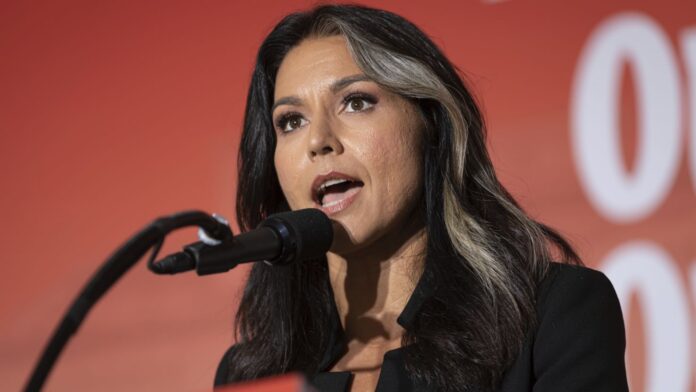In a significant move, US President-elect Donald Trump has named Tulsi Gabbard, a former Democratic Congresswoman and the first Hindu in the US Congress, as the new Director of National Intelligence (DNI). At 43 years old, Gabbard is set to oversee the nation’s intelligence community, providing key security insights and advising the president directly on national security matters. Trump praised Gabbard as a “proud Republican” and expressed confidence in her ability to bring a “fearless spirit” to the role. Despite her notable political experience, Gabbard’s appointment is somewhat surprising due to her lack of direct experience in intelligence.
From Hindu Congresswoman to Intelligence Chief
Tulsi Gabbard’s rise to prominence in American politics is marked by several historical milestones. Born in American Samoa and raised in Hawaii, Gabbard made history as the first Hindu member of the US House of Representatives. She also became the first American Samoan elected to Congress. Gabbard’s political journey began early; at the age of 21, she was elected to Hawaii’s House of Representatives, but her political ambitions paused temporarily after one term.
When she re-entered politics, Gabbard secured a seat in the US Congress representing Hawaii, famously taking her oath of office on the Bhagavad Gita, underscoring her connection to Hindu culture. While Gabbard is often assumed to have Indian heritage, her only connection to Hinduism comes through her mother, who converted and chose Hindu names for her children.
Throughout her four terms in the House, Gabbard became known for her independence and willingness to challenge her party’s leadership. Notably, she endorsed Senator Bernie Sanders during the 2016 Democratic presidential primaries, cementing her position as an important figure in progressive politics.
Presidential Run and Departure from the Democratic Party
In 2020, Tulsi Gabbard made a run for the Democratic presidential nomination, focusing on her opposition to US military involvement overseas. She criticized her party for what she saw as complicity in supporting conflicts that, according to her, destabilized West Asia and harmed American security interests. During a key primary debate, Gabbard made headlines when she clashed with Kamala Harris over her prosecutorial record.
Despite her efforts, Gabbard’s presidential campaign did not gain much traction, and she eventually withdrew her candidacy, endorsing Joe Biden. By 2022, her dissatisfaction with the Democratic Party had grown, leading her to sever ties, citing that the party was no longer the one she joined two decades earlier. She characterized the Democrats as an “elitist cabal of warmongers” and rejected their focus on “woke” ideologies.
Joining Forces with Trump
After parting ways with the Democratic Party, Gabbard initially appeared alongside Robert F. Kennedy Jr., who had launched a challenge against President Biden. Kennedy’s campaign later pivoted towards an independent run, while Gabbard ultimately chose to support Republican leader Donald Trump. She actively participated in Trump’s 2024 presidential campaign, even helping prepare him for a debate against Vice President Kamala Harris.
Gabbard publicly announced her decision to become a Republican during a rally in North Carolina in October, where she shared the stage with Trump. Her endorsement and transition to the Republican Party highlighted her growing alignment with Trump’s policies and the direction of the GOP.
A Unique Choice for National Intelligence
Despite her lengthy military service as a member of the US Army National Guard—including deployments in Iraq and Kuwait—Tulsi Gabbard’s appointment as Director of National Intelligence has surprised many. While Gabbard has a distinguished military background and holds the rank of lieutenant colonel in the US Army Reserves, she has little experience in intelligence operations or senior governmental roles related to intelligence. Her background includes two years on the House Homeland Security Committee, but unlike her predecessors, she lacks experience in managing intelligence agencies.
Outgoing Director Avril Haines, appointed in 2021, was well-regarded for her extensive experience in national security and intelligence. As the first woman to serve in the DNI role, Haines brought a wealth of knowledge from previous high-ranking roles in government. Gabbard’s selection, on the other hand, appears to reflect Trump’s preference for loyalty and alignment with his vision, rather than adherence to conventional expertise.
Controversy and Reaction
Gabbard’s appointment has elicited a range of reactions across the political spectrum. Supporters praise her military background, her bold stance on national security issues, and her ability to challenge the status quo. Her detractors, however, have raised concerns about her lack of experience in intelligence and questioned her ability to navigate the complexities of the intelligence community.
Trump’s choice to appoint Gabbard is seen by many as part of his broader strategy of placing loyalists in key positions, often favoring individuals who challenge the established bureaucracy. Gabbard’s outspoken criticism of the “woke” agenda and her departure from the Democratic Party have also made her a polarizing figure, admired by some conservatives and criticized by many on the left.
What Lies Ahead for Gabbard?
As Tulsi Gabbard steps into her role as Director of National Intelligence, she will face significant challenges, both domestically and internationally. The intelligence community is tasked with addressing complex threats, from cybersecurity to international terrorism. Gabbard’s lack of direct intelligence experience means she will have to rely heavily on the expertise of the seasoned officials and analysts within the agencies she will oversee.
Despite the challenges, Gabbard has expressed her commitment to “championing our constitutional rights and securing peace through strength,” echoing Trump’s stance on national security. Her appointment will be closely watched, as she transitions from being a controversial political figure to holding one of the most critical roles in the federal government.
Her success in this position will depend not only on her ability to adapt to the intricacies of the intelligence world but also on how effectively she can bridge the partisan divide that has come to define much of her political career. With a new administration that values loyalty, Gabbard’s “fearless spirit” might just be what Donald Trump believes the intelligence community needs at this juncture.

